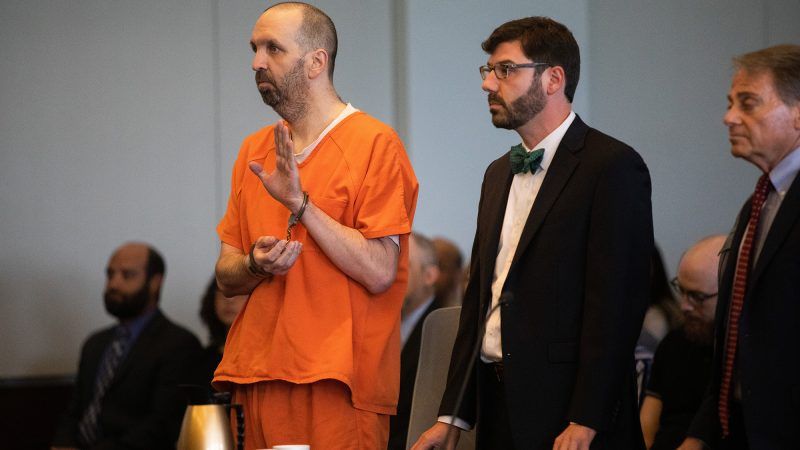Did Craig Hicks Murder His Neighbors Because They Were Muslims? Should It Matter Legally?
The debate about whether the killer should have been prosecuted for federal hate crimes shows how the Justice Department targets defendants based on the opinions they express.

Yesterday Craig Hicks pleaded guilty in state court to murdering three of his neighbors, all Muslim college students, at an apartment complex in Chapel Hill, North Carolina, four years ago. Hicks says he shot his victims—19-year-old Razan Mohammad Abu-Salha; her 21-year-old sister, Yusor Mohammad Abu-Salha; and Yusor's 23-year-old husband, Deah Shaddy Barakat—because of a parking dispute. Their families believe he shot the students because he hates Muslims. The dispute illustrates the fuzziness of hate crime laws and the degree to which their enforcement hinges on speech that would otherwise be constitutionally protected.
North Carolina has several statutes aimed at crimes motivated by bigotry, but none of them applies to murder cases. That hardly seems to matter, since Hicks received three consecutive life sentences without the possibility of parole. If he had been convicted of federal hate crimes, he might have received the death penalty. (Or he might not have.) But the argument about how to describe his crimes seems to be about the message his prosecution sends rather than the penalty he receives.
During a hearing last week, Hicks' lawyers tried to block expert testimony about "implicit bias." The New York Times reports that Durham County District Attorney Satana Deberry "responded that Mr. Hicks was trying to avoid punishment for what she repeatedly called his 'white supremacist' worldview." That's a telling way of putting it, since people's opinions, no matter how ugly, are not supposed to be punishable by law in the United States.
If Hicks had been charged with federal hate crimes, prosecutors would have had to prove that he shot his victims "because of" their religion. According to a federal appeals court ruling that the Justice Department cited in explaining its decision not to take on the case, that would have required showing that Hicks would not have murdered his neighbors "but for" their religion, which would have been hard to do.
Prior to his crimes, Hicks was an outspoken atheist and critic of organized religion, a subject he discussed on social media. But the evidence of a specific anti-Muslim bias is less clear. "I've defended Muslims," he told the Times in a jailhouse interview. "I know Muslims. I take pity on them, the way society treats them like they are lesser people." He denied even knowing that his neighbors were Muslims, although the women wore headscarves and he contradicted himself by criticizing them for not properly observing Ramadan.
At the same time, Hicks was known to confront and quarrel with people of various backgrounds, especially over parking. This would hardly be the first case of murderous violence inspired by trivial issues.
Ripley Rand, then the U.S. attorney for the Middle District of North Carolina, met with the victims' relatives in 2015 but declined to prosecute Hicks. He told the Times (in the newspaper's paraphrase) that "the federal government was meant to intervene if local authorities could not or would not do their jobs," which "did not seem to be the case" here, since Hicks "seemed destined to spend the rest of his life in prison."
That is demonstrably not the Justice Department's general policy, since defendants such as Charleston mass murderer Dylann Roof, Charlottesville killer James Fields, and Pittsburgh shooter Robert Bowers have been prosecuted for federal hate crimes even though state courts were clearly willing and able to handle the cases. Given such precedents, it is not hard to understand the frustration expressed by Mohammad Abu-Salha, father of the women Hicks killed.
"If a Muslim man knocked on a door and executed a Christian family in their home with no provocation, that would be called terrorism," Abu-Salha told the Times. "But we Muslims are soft targets."
Contrary to the implication, the crucial difference in this case seems to be the absence of evidence documenting the defendant's bigotry. Roof published a racist manifesto. Fields used "multiple social media accounts" to "express his beliefs regarding race, national origin, religion and other topics." Bowers posted anti-Semitic comments and said things "evincing an animus towards people of the Jewish faith." If Hicks had left a similar trail of hateful statements, it seems likely that the Justice Department would have intervened, notwithstanding North Carolina's undoubted willingness to prosecute and punish him.
The decision to charge someone with federal hate crimes exposes him to dual prosecutions for the same conduct, so he can be tried again if he is initially acquitted (or even if he is convicted). Federal prosecution also may increase the penalty he faces, changing a life sentence to execution or a short prison term to a long one. When the Justice Department makes that decision based on the views people have expressed, it is effectively targeting defendants for extra jeopardy and extra punishment because of their opinions. Instead of questioning such belief-based inequality, Americans have learned to demand it.


Show Comments (27)